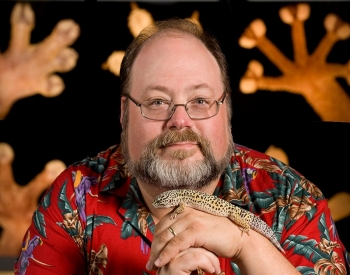Villanova University Biology Professor Receives Grant from National Science Foundation for African Lizard Research

VILLANOVA, Pa.—Villanova University's Aaron Bauer, PhD, professor of Biology and Gerald M. Lemole, MD, Endowed Chair in Integrative Biology in the College of Liberal Arts and Sciences, is the principal investigator on a $388,229 grant from the National Science Foundation to support his project, “Collaborative Research: Assessing the Systematics and Diversity of Haemosporida in African lizards.”
Haemosporida are single-celled symbionts found in terrestrial vertebrates in almost all world ecosystems and cause malaria in birds and humans. Symbiosis is a close and prolonged interaction between organisms of different species, and symbiont diversity offers a unique window to observe ecosystem dynamics and evolutionary processes. When symbionts switch host organisms, it can reveal risk factors leading to infectious disease emergence in those hosts.
Dr. Bauer’s project will provide research and training opportunities to Villanova undergraduate and graduate students, and will focus on African lizards as host organisms. It will investigate Haemosporida as elements of biodiversity and provide new insights into regional evolutionary and ecological processes. The study’s broadest impacts will include informing conservation efforts in sub-Saharan Africa; generating specimens that can be used by others interested in symbionts; and producing a sustainable database that records detection-based occurrences in Haemosporida which will be transferable to other parasites.
Dr. Bauer is a world-renowned herpetologist whose research concentrates on the morphology and systematics of geckos and other lizards. His decades of field work in the deserts and forests of southern Africa, Asia and Australia have helped to reveal not only patterns of distribution, but also to document the diversity of reptile species. Dr. Bauer has described more new species of reptile than any other living scientist, including more than seven percent of the more than 1,600 living geckos. He was recently part of a research team that discovered a new species of gecko from Eocene Europe which provides new evidence for the early history of geckos on that continent.
About Villanova University: Since 1842, Villanova University’s Augustinian Catholic intellectual tradition has been the cornerstone of an academic community in which students learn to think critically, act compassionately and succeed while serving others. There are more than 10,000 undergraduate, graduate and law students in the University's six colleges—the College of Liberal Arts and Sciences, the Villanova School of Business, the College of Engineering, the College of Nursing, the College of Professional Studies and the Villanova University Charles Widger School of Law. Ranked among the nation’s top universities, Villanova supports its students’ intellectual growth and prepares them to become ethical leaders who create positive change everywhere life takes them. For more, visit www.villanova.edu.
